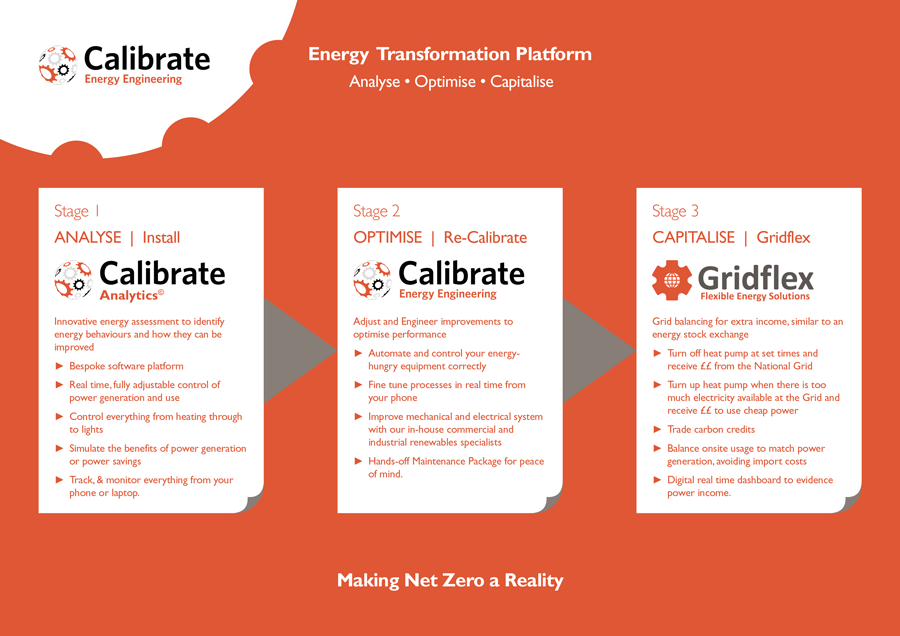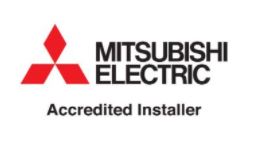Advertiser content
Farmer reduces electricity costs by re-engineering RHI heatpump
Provided by
Calibrate Energy Engineering are multi-award winning specialists in designing, installing and maintaining commercial renewable systems including air/ground source heat pumps and Combined Heat & Power plants for high energy-use industries.
Calibrate Analytics © transforms aging heat pump from a financial drain into an appreciating asset, saving £117,000 per annum.
Rob Timmis presides over H Timmis Farms near Telford, a poultry stronghold of some 300,000 broilers.
With a significant 10-year contract supplying a major supermarket chain, his reliance on on-demand and consistent heat for his chickens is paramount.
To safeguard and future-proof his business, Mr Timmis took the bold decision seven years ago to install solar photovoltaics and a ground source heat pump as part of his poultry business diversification strategy.
However, fast forward to 2022 and with an aging system, and following unprecedented events including a global pandemic and a war that sent energy prices rocketing, the business was feeling the pinch, so when Calibrate Energy Engineering (who were not the original installer) showed how their innovative software could evaluate how energy costs and carbon could be slashed, Mr Timmis’ attention was piqued.
Calibrate were increasingly seeing cases of older heat pumps and owners who were struggling to get the benefits due to antiquated and often unmaintained systems that weren’t performing as optimally as they should.
Having developed Calibrate Analytics © pre-Covid, a clever controller to interrogate the pump’s and site’s energy use and identify ways to save money, Calibrate were in an ideal position to help the farm mitigate against down time and rising costs so the system returned to its position as cornerstone of the business.
Heat pumps should be immensely efficient, with multi-heat, chilling and energy-generating opportunities and Calibrate are approved installers for Mitsubishi due to the high quality product.
However, not all systems meet these exacting standards and inefficient systems are bad for business, giving misconceptions that pollute any in-road towards making net zero a reality, a perception Calibrate work tirelessly to quash and resolve.
That said, taking on other installers’ work is not something Calibrate do lightly as it can be fraught with problems, but given the context and market demand for bringing perfectly serviceable systems like Timmis’ back on track, Calibrate have devised a business model for optimising systems using a mix of data analytics and engineering reworks.
Rob Deverson, Business Development Manager for Calibrate explains the client’s predicament:
“Mr Timmis is a very forward-thinking farmer, but on this occasion had fallen foul of being an early adopter of renewables.
As the technology has moved on a pace since installation, he was finding lack of maintenance and upgrades had left him feeling it was a financial drain rather than an appreciating asset.
“We plugged in our innovative software and could show him, in real time, what some simple changes would make to his bottom line, not just restoring the system to its former glory, but surpassing it.
From the data gathered from the controller, the team set about designing a series of improvements to transform performance.”
The client made it clear that the team needed to fit around tight seasonal farming deadlines ensure minimal business disruption, and Rob Timmis explains what persuaded him to agree to the plans:
“Poultry needs heat, it sounds simple but it’s time critical getting the sheds to the right temperature of 32 degrees and remaining consistent. However, costs to ensure this were skyrocketing beyond what had been budgeted for.
To put that into perspective, our electricity escalated from 11p per KW to 22p with annual costs going from £220,000 to £440,000 and still climbing.
“There wasn’t a silver bullet solution against rising energy costs, but I knew I needed to generate more electricity and use what we had more efficiently as the Government’s RHI tariff was no longer covering what we needed it to.
I spoke to a local farmer that had engaged Calibrate in a similar project and it persuaded be to move forward with the proposal.”
The heat pump’s co-efficiency of performance was also a problem, sitting at just 2.0 with Ofgem’s lowest requirement being 2.9. Not only was the system under-performing, but it was also putting the farm’s substantial RHI tariff rebate in jeopardy.
As a result of the control software addressing system inefficiencies and parasitic loads caused by unnecessary plant running times, the COP quickly increased to 3.0 finally taking it beyond Ofgem standard.

Not just poultry savings for Telford farmer, Rob Timmis of H Timmis Farms © Calibrate Energy Engineering
The next big step change occurred when Calibrate carried out pipe re-works to the heating loop. The outcome was a COP jump to over 4.0, a 100 percent improvement on its original state, a great result for Mr Timmis:
“These improvements have had a massive impact on my bottom line by slashing my electricity input from the grid to offset much of the cost increases meaning a swift return on investment of my outlay for the re-works.
In addition, I am using much fewer KWh to run the heat pump, so this has significantly reduced my CO2 output from grid electricity, making the farm greener.
“Calibrate has delivered above expectation at each stage of the process and knowing the importance of keeping the system optimised, I am now looking at a long-term Maintenance and Warranty package.
If you have a heat pump or are considering installing one, Calibrate will certainly capture efficiencies, as well as work around the client’s business requirements and timescales.
Following this sort of project, the next stage that Timmis and other farms can then consider after a software upgrade is Calibrate’s Gridflex service, where the controller acts as an energy aggregator, adjusting electricity use at peak times and selling excess energy back to the National Grid.
Gridflex fully manages this behaviour, providing clients with a totally hands-free passive income running in parallel to business as usual.
Mr Timmis concludes: “To keep ahead in these uncertain times, you have to speculate to accumulate by making some bold business choices.
To truly future proof your business, that is to build in financial, operational and environmental resilience, it is well worth installing Calibrate Analytics as stage one of your business transformation strategy, to allow energy to work for you, rather than against.”


